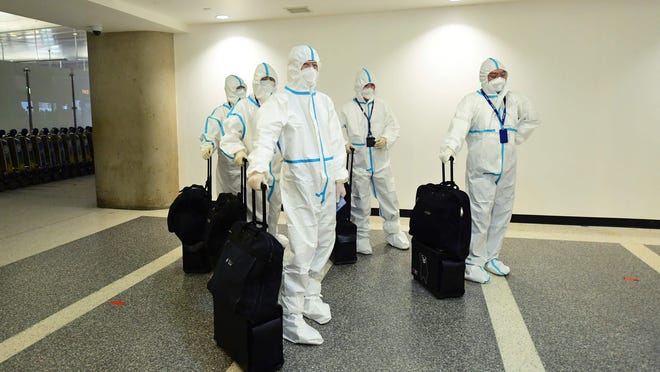
Another new variant, boosters and concerns about rising infections. It's nearly two years since COVID-19 became an international pandemic. When will the world decide it is over?
There’s no clear-cut definition for when a pandemic starts and ends, and how much of a threat a global outbreak is posing can vary by country.
“It’s somewhat a subjective judgment because it’s not just about the number of cases. It’s about severity and it’s about impact,” says Dr. Michael Ryan, the World Health Organization’s emergencies chief.
In January 2020, WHO designated the virus a global health crisis “of international concern.” A couple of months later in March, the United Nations health agency described the outbreak as a “pandemic,” reflecting the fact that the virus had spread to nearly every continent.
The pandemic may be widely considered over when WHO decides the virus is no longer an emergency of international concern, a designation its expert committee has been reassessing every three months. But when the most acute phases of the crisis ease within countries could vary.
“There is not going to be one day when someone says, ‘OK, the pandemic is over,’” says Dr. Chris Woods, an infectious disease expert at Duke University. Although there are no universally agreed-upon criteria, he said countries will likely look for sustained reduction in cases over time.
Scientists expect COVID-19 will eventually settle into becoming a more predictable virus like the flu, meaning it will cause seasonal outbreaks but not the huge surges we’re seeing right now. But even then, Woods says some habits, such as wearing masks in public places, might continue.
“Even after the pandemic ends, COVID will still be with us,” he says.
Also in the news:
►Wisconsin hospitals are facing staffing shortages and a severe lack of beds in intensive care units as COVID-19 infections rise. Less than 3% of ICU beds were available in the state as of Thursday.
►Finland Prime Minister Sanna Marin, one of the world's youngest elected leaders, apologized this week after facing backlash for spending a night out in Helsinki after she was exposed to COVID-19.
📈Today's numbers: The U.S. has recorded more than 49.6 million confirmed COVID-19 cases and more than 794,000 deaths, according to Johns Hopkins University data. Global totals: More than 268.4 million cases and 5.2 million deaths. More than 200 million Americans — 60% of the population — are fully vaccinated, according to the CDC.
📘What we're reading: Researchers say the U.S. has been undercounting COVID deaths. Now we have a new tool to figure out why. Read more here.
Keep refreshing this page for the latest news. Want more? Sign up for USA TODAY's Coronavirus Watch free newsletter to receive updates directly to your inbox and join our Facebook group.
Should you put vaccination status on your resume? More people are.
As a near-record number of Americans switch jobs each month, they’re wrestling with a dilemma that has nothing to do with the employment gap created by a pandemic-related layoff.
The question, borne of our unprecedented COVID-19 era: Should you include your vaccination status on your resume?
The short answer: It probably won’t hurt and could help you land a position.
As a result, a growing number of vaccinated job candidates are acknowledging that status on their resumes, career and resume advisors say. The question is a thorny one because vaccinations themselves have become somewhat controversial.
“It could be a dangerous precedent – you’re putting health information on a resume,” says Lisa Rangel, CEO of Chameleon Resumes, a resume and job search consulting service.
Then there’s the question of whether the move will be a boost or hindrance to your chances of getting hired.
About 63% of companies are requiring COVID-19 vaccinations for staffers, according to a survey of 1,250 hiring managers in August by ResumeBuilder.com. About 84% of adults 18 and over are fully vaccinated, according to the Centers for Disease Control and Prevention.
At the same time, the public has been divided. In August, 49% of Americans favored vaccination mandates and 46% were opposed, a CNBC survey shows.
– Paul Davidson
Source link









